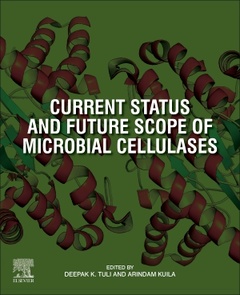Description
Current Status and Future Scope of Microbial Cellulases
Coordinators: Tuli Deepak K., Kuila Arindam
Language: English
Subject for Current Status and Future Scope of Microbial Cellulases:
Keywords
Cellulase; Cellulose; Fermentation; Microbial sources; Polysaccharide; Catalytic carbohydrate-binding modules; Thermophilic microorganisms; Production; Characterization; Applications; Lignocellulosic biomass; Immobilization; Ethanol; Microorganisms; Solid state fermentation (SSF); Submerged fermentation (SmF); Bioreactors; Pretreatment; Enzymatic hydrolysis; Fermentable sugars; Biofuel; Lignocellulose; Biomass; Bioethanol; Microbial cellulases; Catalytic activities; Genetic engineering; Protein engineering; Value-added products; Cellulases; Deinking; Laccase; Hydrolysis; Feedstocks; Animal sources; Plant sources; Cellulases system; Actinomycetes; Biobased products; Plethora; Industrial applications; Cellulase mechanism; Cellulase applications; Endocellulase; Exocellulase; Paper production; Wine manufacturing; Food processing; Manufacturing; Agricultural residues; Developments; Microbial cellulase; Bioprocessing; Biomass waste; Cellulase production; Endoglucanases; Exoglucanases; Feedstock
414 p. · 19x23.3 cm · Paperback
Description
/li>Contents
/li>Biography
/li>Comment
/li>
1. Cellulase production using different microbial sources 2. Molecular structure and function of cellulases 3. Cellulases through Thermophilic Microorganisms: Production, Characterization and Applications 4. Microbial Cellulase for the Conversion of Lignocellulosic Biomass 5. Bioprocess developments for improved cellulase production 6. Cellulase enzyme: an overview 7. Different types of pretreatment of lignocellulosic biomass for improved biofuel production 8. Pretreatment process and its effect on enzymatic hydrolysis of biomass 9. Engineering of Microbial Cellulases for Value added Product Generations 10. Industrial application of cellulases 11. Characterization of cellulolytic enzyme for its application in biomass conversion 12. Structural and Functional role of Cellulases 13. Cellulases in paper and pulp, brewing and food industries: principles associated with its diverse applications 14. Microbial cellulases: An approach towards recent advances in research, their application, and future perspectives 15. Optimization and strategies for the production of microbial cellulases and their potential industrial applications 16. Microbial cellulases application in production of biofuels 17. Biomass waste: a potential feedstock for cellulase production 18. Use of genetic engineering/metabolic engineering approach for enhanced cellulase production
Dr. Arindam Kuila is currently working as Assistant Professor at the Department of Bioscience & Biotechnology, Banasthali Vidyapith (Deemed University), Rajasthan. Previously, he worked as a research associate at Hindustan Petroleum Green R&D Centre, Bangalore. He did his PhD from Agricultural & Food Engineering Department, Indian Institute of Technology Kharagpur in 2013 in the area of lignocellulosic biofuel production. His major areas of research are enzyme technology, bioprocess development for biofuel production and biopolymer production from lignocellulosic biomass. He has one Indo-Brazil collaborative project funded by DBT, New Delhi. He has guided 2 PhD students and currently 4 PhD students are working under his guidance. He has published 7 edited books, 8 book chapters, 28 papers in peer reviewed Journals and filled 5 patents. He is currently acting as guest editor for the Journal of Food Process Engineering (Wiley, Impact Factor: 2.356) and Biomass Conversion and Biorefinery Joournal (Springer, Impact Factor: 4.987).
- Covers the present industrial scenarios and future prospect of cellulase production
- Describes the molecular structure of cellulase
- Explores genetic engineering, metabolic engineering and other approaches for improved cellulase production
- Includes different applications of cellulases, including their application in the bioenergy sector




